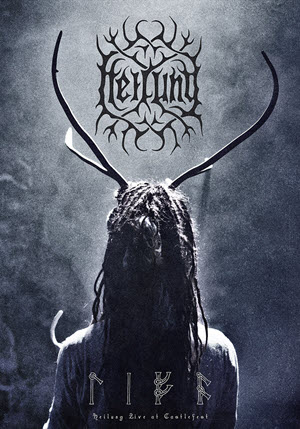Heilung – LIFA
 So there I was chatting away with a friend online while watching Glastonbury. We were watching different stages, and I happened to mention that The Pretenders were playing “Hymn to Her”, because how can you not when you have a song like that and are at Glastonbury. Then Katie says, “Have you heard of Heilung?”
So there I was chatting away with a friend online while watching Glastonbury. We were watching different stages, and I happened to mention that The Pretenders were playing “Hymn to Her”, because how can you not when you have a song like that and are at Glastonbury. Then Katie says, “Have you heard of Heilung?”
No, reader, I had not, because I am hopelessly out of the loop as regards modern music. I have become Old. But I do know how to Google, so I had a look on YouTube, and there was this bunch of people dressed as Nordic shamen playing instruments that looked like they had been dug up from an Iron Age village. Oh my. Folk music has come on a bit since Fairport Convention.
Heilung’s music is rooted in Germanic/Nordic mythology and the lyrics often consist of nothing but wailing, grunting and chanting the names of the gods. It is wonderfully atmospheric. Whether it has anything in common with music that was actually played by and ancient Norse and Germanic people is another matter, but it sounds like it ought to have. It is no surprise that some of their music was used in the Vikings TV series.
The album I’m reviewing here – Lifa – was recorded live on Lughnasadh at Castlefest in the Netherlands, which is apparently a popular venue for Neo-Mediaeval bands. If you are interested, you can watch the whole thing on YouTube. I think you’ll agree that they look the part.
In case you are worrying, ‘heilung’ means ‘healing’. The band has been featured in The Guardian, and I don’t think that would happen if they were Nazis, unless of course they also started going on about how they were only asking reasonable questions about women’s safety.
In addition to the Nordic stuff, the band has some songs inspired by Mesopotamian religion. I’m hoping that they will get together with my friend, Sophus Helle, and put the poems of Enheduanna to music. It seems an obvious thing to do.
Which reminds me, I have a copy of Sophus’s new book of translations of those poems, which I must review for you at some point.
Anyway, Heilung are interesting in part because of their dedication to exploring the sounds of the deep past, and partly because they create some really interesting soundscapes. There’s nothing electronic about Heilung’s work, but some of it is definitely a sort of trance music. Other songs are more reminiscent of a Māori Haka. If you fancy a bit of weird, neo-pagan music, you should check them out. I recommend headphones.